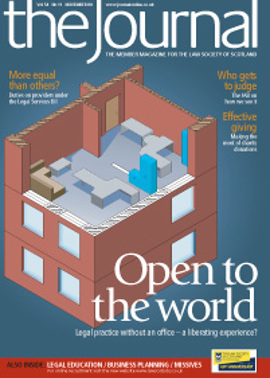Time on whose side?

Of the many changes which the Planning Etc (Scotland) Act 2006 has brought into force, perhaps the most important for legal advisers are the fundamental changes to statutory time limits and processes for determining applications and lodging planning appeals. These apply to all planning decisions made and appeals lodged on or after 3 August 2009.
The Town and Country Planning (Development Management Procedure) (Scotland) Regulations 2008 require planning authorities to determine all applications for “national” and “major” development within four months, and applications for “local” development within two months, of their validation date. It is likely that these time limits will not be met, and s 47(2) of the 1997 Planning Act allows the applicant and the planning authority to agree in writing to extend these periods. If the applicant does not so agree, any appeal against a non-determination of an application (or “deemed refusal”) must be made within three months of the determination period. An agreement to extend continues the right to appeal until three months after the agreed extended period. Previously, planning authorities normally had two months to determine any application, and applicants had six months in which to lodge an appeal.
Solicitors should be aware of the recent decision Vattenfall Wind Power v Scottish Ministers [2009] CSIH 27. The court held that the right of appeal on a deemed refusal lasted for six (now three) months from the date the statutory period for determination expired. Therefore, if the applicant and the planning authority do not agree to extend the period before it expires, the right of appeal against non-determination will still expire at the end of three months following the initial two or four month determination period.
Appeal to local review body
Different procedures apply to appeals depending on whether the application to which they relate has been decided under the planning authority’s statutory scheme of delegation (“SD”). SD is a process for decision-making on applications for “local development”. As there is a different SD for each planning authority it is important to establish its applicability to the case in hand.
If it does apply, the planning decision is taken by a planning officer under delegated powers. There is no appeal against that decision but only a right of review to a local review body (“LRB”). The applicant must lodge a “notice of review” within three months. The LRB is made up of not less than three councillors. The review can be undertaken by written submissions or by a hearing. Concerns have been expressed on the transparency of this process as compared with the former procedure of the Scottish Ministers appointing a reporter to decide an appeal. There is a final right of appeal from the LRB to the Court of Session, on a point of law only, within six weeks of the original review decision. There is also a right of appeal to the Scottish Ministers, but only where there has been “deemed refusal” by the LRB.
Appeal to Scottish Ministers (DEPA)
All other applications for national, major and local development (not delegated under SD) may be appealed to the Scottish Ministers. Notice of appeal must be served within three months from either the date of the decision notice or the expiry of the period of determination.
The automatic right to appear and be heard by a reporter has been removed. The applicant no longer has the right to demand a public local inquiry (“PLI”) or hearing. Instead, it is for the reporter to decide if a PLI or hearing will take place. It may be that the reporter is satisfied on receipt of the appeal documentation that they are able to take the decision, and the Act and regulations provide for this. Tactically, there were advantages in previously having this right, which included the important right to challenge evidence by cross examination at a PLI. For the more complex cases, or cases where it is perceived that there is an advantage in proceeding by PLI, solicitors may submit that such procedure would be appropriate, but the appellant can no longer demand this of right.
A further change to appeal procedure is that parties cannot raise new matters on appeal unless they can meet the statutory tests, that they could not have raised the matter before or it is a consequence of “exceptional circumstances” (not defined). The Act makes it clear that this does not remove the requirement in the appeal for the decision-maker to have regard to the development plan and material considerations. It remains to be seen how parties to the appeal will deal with this, but it is likely that applicants will frontload applications with all necessary supporting material, rather than risk having any such material rejected at appeal as being a “new matter”.
The application itself cannot be varied once appealed, and this is a further limitation on the appellant: previously it was acceptable practice to vary applications at appeal, albeit by way of non-material variations.
Alastair McKie, Head of Planning and Environment, Anderson Strathern LLP
In this issue
- The equality, diversity and discrimination agenda: change and challenge ahead
- Justice on the green front
- Let the light in
- Needs of the family
- Reality on the West Bank
- Outside of the box
- Effective philanthropy
- Case for the defence
- Taking on the system
- Same rules for all?
- The benchmark
- Law reform update
- From the Brussels Office
- Appreciation: David Hector MacNeill
- Halfway to the Big Bang
- The same but different
- Five steps forward
- Ask Ash
- Preparing for disaster
- Rules a-changing
- Fair competition
- Time on whose side?
- 40 days and 40 nights
- Hear the grown-ups
- Problems of transition
- Scottish Solicitors' Discipline Tribunal
- Website review
- Book reviews
- Life on the other side
- Never waste a good crisis






